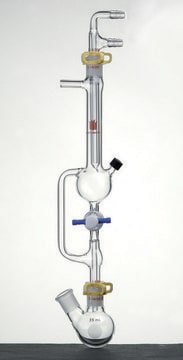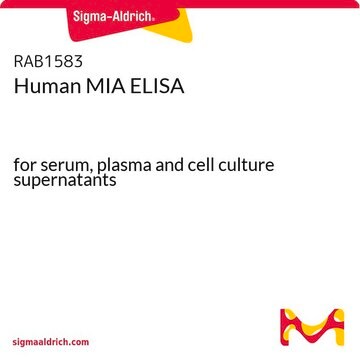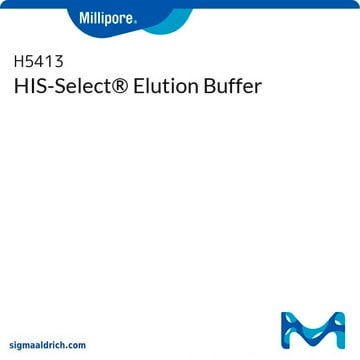11976826001
Roche
MIA ELISA
sufficient for ≤96 tests, Roche, kit of 1 (9 components), suitable for ELISA
Synonym(s):
ELISA
Sign Into View Organizational & Contract Pricing
All Photos(2)
About This Item
UNSPSC Code:
41116158
Recommended Products
usage
sufficient for ≤96 tests
Quality Level
packaging
kit of 1 (9 components)
manufacturer/tradename
Roche
technique(s)
ELISA: suitable
storage temp.
2-8°C
General description
One-step immunoreaction—photometric enzyme immunoassay for the quantitative in vitro determination of human Melanoma Inhibitory Activity (MIA) in streptavidin-coated microplates.
Standards: Six standards, ranging from 0 to 50 ng/ml MIA protein, are provided with lot-specific data.
Standards: Six standards, ranging from 0 to 50 ng/ml MIA protein, are provided with lot-specific data.
Specificity
The MIA ELISA detects natural and recombinant human melanoma inhibitory activity protein. No cross-reaction with other serum components has been found.
Immunogen
Detailed epitope structure is not known. The epitopes recognized by the antibodies are conformation epitopes, no linear structures. This is why the abs are not suitable for Western (denaturation destroys epitopes). The two antibodies recognize different epitopes (non-overlapping).
The antibodies recognize non-overlapping epitopes, which are conformational epitopes (no linear sequence is recognized but rather parts of 3D-conformation). Exact epitopes have not been determined.
The antibodies recognize non-overlapping epitopes, which are conformational epitopes (no linear sequence is recognized but rather parts of 3D-conformation). Exact epitopes have not been determined.
Application
For research use only. Not for use in diagnostic procedures.
The MIA ELISA is an ideal application in research studies determining the melanoma inhibitory activity protein in serum and plasma.
The MIA ELISA is specially developed for the quantitative in vitro determination of MIA protein in serum and plasma within streptavidin-coated microplates (MPs). It has a wide applictaion in MIA (melanoma inhibitory activity) ELISA assays.
The MIA ELISA is an ideal application in research studies determining the melanoma inhibitory activity protein in serum and plasma.
The MIA ELISA is specially developed for the quantitative in vitro determination of MIA protein in serum and plasma within streptavidin-coated microplates (MPs). It has a wide applictaion in MIA (melanoma inhibitory activity) ELISA assays.
Packaging
1 kit containing 9 components.
Preparation Note
Working solution: Beside the ready-to-use solutions supplied with this kit, you will need to prepare the following working solution:
Roche recommends using only double distilled water for the reconstitution of lyophylizates.
Storage conditions (working solution): Anti-MIA-Biotin (vial 1):
6 months at -15 to -25 °C or ≤ -60 °C when aliquoted and shock-frozen
Anti-MIA-Peroxidase (vial 2):
6 months at -15 to -25 °C or ≤ -60 °C when aliquoted and shock-frozen
MIA-Standard (vial 3):
1 day at 2 to 8 °C or 6 months at -15 to -25 °C or ≤ -60 °C when aliquoted and shock-frozen
MIA-Control Serum (vial 4):
1 day at 2 to 8 °C or 6 months at -15 to -25 °C or ≤ -60 °C when aliquoted and shock-frozen
Washing Buffer (vial 6): 1month at 2 to 8 °C
Immunoreagent: 8 hours at 2 to 8 °C
- Anti-MIA-Biotin: Reconstitute the lyophilizate in 0.7 ml double-dist. water for 10 minutes at 15 to 25 °C and mix thoroughly. Do not vortex.
Result: A clear, colorless solution. - Anti-MIA-Peroxidase: Reconstitute the lyophilizate in 0.7 ml double-dist. water for 10 minutes at 15 to 25 °C, and mix thoroughly. Do not vortex.
Result: A clear, slightly yellowish solution. - MIA Standard: Reconstitute the lyophilizate in 0.5 ml double-dist. water for 10 minutes at
15 to 25 °C, and mix thoroughly.Do not vortex.
Result: A clear, colorless solution. Concentration indicated on the label. - MIA Control Serum: Reconstitute the lyophilizate in 0.3 ml double-dist. water for 10 minutes at 15 to 25 °C, and mix thoroughly. Do not vortex.
Result: A Slightly opalescent and yellowish solution. Concentration indicated on the label. - Washing Buffer : Dissolve one tablet in 2 l of double-dist. water.
Result: A clear, colorless solution. - Immunoreagent: For 8 wells (1.8 ml): Add 50 μl reconstituted anti-MIA-Peroxidase (solution 2) to 1.7 ml Incubation Buffer, and mix well. Then add 50 μl of anti-MIA-biotin
(solution 1), and mix thoroughly. Do not vortex.
Result: A clear, colorless solution.
Roche recommends using only double distilled water for the reconstitution of lyophylizates.
Storage conditions (working solution): Anti-MIA-Biotin (vial 1):
6 months at -15 to -25 °C or ≤ -60 °C when aliquoted and shock-frozen
Anti-MIA-Peroxidase (vial 2):
6 months at -15 to -25 °C or ≤ -60 °C when aliquoted and shock-frozen
MIA-Standard (vial 3):
1 day at 2 to 8 °C or 6 months at -15 to -25 °C or ≤ -60 °C when aliquoted and shock-frozen
MIA-Control Serum (vial 4):
1 day at 2 to 8 °C or 6 months at -15 to -25 °C or ≤ -60 °C when aliquoted and shock-frozen
Washing Buffer (vial 6): 1month at 2 to 8 °C
Immunoreagent: 8 hours at 2 to 8 °C
Kit Components Only
Product No.
Description
- Anti-MIA-biotin antibody, monoclonal from mouse, lyophilized (clone 2.F7.3B1)
- Anti-MIA-peroxidase antibody, monoclonal from mouse, lyophilized (clone 1.A12.9A1)
- MIA Standard, lyophilized
- MIA Control Serum, MIA in human serum, lyophilized approximately 25 ng/ml
- Incubation Buffer ready-to-use
- Washing Buffer
- ABTS Substrate Solution ready-to-use
- Streptavidin-coated Microplate modules
- Self-adhesive Plate Cover Foils
See All (9)
Signal Word
Warning
Hazard Statements
Precautionary Statements
Hazard Classifications
Aquatic Chronic 3 - Skin Sens. 1
Storage Class Code
12 - Non Combustible Liquids
WGK
WGK 3
Flash Point(F)
does not flash
Flash Point(C)
does not flash
Certificates of Analysis (COA)
Search for Certificates of Analysis (COA) by entering the products Lot/Batch Number. Lot and Batch Numbers can be found on a product’s label following the words ‘Lot’ or ‘Batch’.
Already Own This Product?
Find documentation for the products that you have recently purchased in the Document Library.
Miyako Kurihara-Shimomura et al.
International journal of oncology, 56(5), 1093-1100 (2020-04-23)
Mast cells (MCs) are present in the tumor stroma, and MCs that express the mast cell‑specific proteases tryptase and chymase (MCTC) exhibit several tumor‑related functions. It was previously reported that melanoma inhibitory activity (MIA) gene family members, including MIA, MIA2
Harriet M Kluger et al.
Clinical cancer research : an official journal of the American Association for Cancer Research, 17(8), 2417-2425 (2011-04-14)
With the rising incidence of melanoma, more patients are undergoing surveillance for disease recurrence. Our purpose was to study levels of proteins that might be secreted in the blood of patients with metastatic melanoma that can be used for monitoring
Our team of scientists has experience in all areas of research including Life Science, Material Science, Chemical Synthesis, Chromatography, Analytical and many others.
Contact Technical Service









